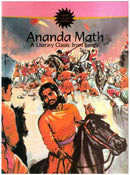Bankim Chandra Chattopadhyay (1838-1894) is considered to be one of the greatest writers in the world of Bengali literature. One of his most popular novels Ananda Math, considered to be a milestone in the history of modern fiction in India, reeived such wide acclaim in the late 19th century that he came to be referred to as the walter scott of India. Translations of this story appeared in Telugu, Kannada, Malayalam, Hindi and Urdu. This vividly described story depicts the struggle for freedom in 1773 Bengal.
The British stronghold had gripped Bengal. The rural population starved and suffered, struggling to meet the taxes imposed upon thim by thie\eur rulers poverty stricken villages were left in a state of near abandon. In the face of all this misery, one young man named Satyananda yearned for truth, justice and freedom, and left his home to fight for his motherland. Soon, many others followed suit, and this band of patriotic youngsters came to be know as santaans (children).
The novel Ananda Math played an important role in fostering militant nationalism in Bengal I the early 20th century. Emulating the santaans, many young men gave up their homes and families to join secret societies that worked towards freeing India.
The songs Vande Mataram, which Bankim Chandra first wrote in this novel, echoed through the Indian freedom movement, inspiring patriotism and resolve. It was heard on the lips of many as they braved the lathis of the British police.
The British stronghold had gripped Bengal. The rural population starved and suffered, struggling to meet the taxes imposed upon thim by thie\eur rulers poverty stricken villages were left in a state of near abandon. In the face of all this misery, one young man named Satyananda yearned for truth, justice and freedom, and left his home to fight for his motherland. Soon, many others followed suit, and this band of patriotic youngsters came to be know as santaans (children).
The novel Ananda Math played an important role in fostering militant nationalism in Bengal I the early 20th century. Emulating the santaans, many young men gave up their homes and families to join secret societies that worked towards freeing India.
The songs Vande Mataram, which Bankim Chandra first wrote in this novel, echoed through the Indian freedom movement, inspiring patriotism and resolve. It was heard on the lips of many as they braved the lathis of the British police.
Description
Bankim Chandra Chattopadhyay (1838-1894) is considered to be one of the greatest writers in the world of Bengali literature. One of his most popular novels Ananda Math, considered to be a milestone in the history of modern fiction in India, reeived such wide acclaim in the late 19th century that he came to be referred to as the walter scott of India. Translations of this story appeared in Telugu, Kannada, Malayalam, Hindi and Urdu. This vividly described story depicts the struggle for freedom in 1773 Bengal.
The British stronghold had gripped Bengal. The rural population starved and suffered, struggling to meet the taxes imposed upon thim by thie\eur rulers poverty stricken villages were left in a state of near abandon. In the face of all this misery, one young man named Satyananda yearned for truth, justice and freedom, and left his home to fight for his motherland. Soon, many others followed suit, and this band of patriotic youngsters came to be know as santaans (children).
The novel Ananda Math played an important role in fostering militant nationalism in Bengal I the early 20th century. Emulating the santaans, many young men gave up their homes and families to join secret societies that worked towards freeing India.
The songs Vande Mataram, which Bankim Chandra first wrote in this novel, echoed through the Indian freedom movement, inspiring patriotism and resolve. It was heard on the lips of many as they braved the lathis of the British police.
The British stronghold had gripped Bengal. The rural population starved and suffered, struggling to meet the taxes imposed upon thim by thie\eur rulers poverty stricken villages were left in a state of near abandon. In the face of all this misery, one young man named Satyananda yearned for truth, justice and freedom, and left his home to fight for his motherland. Soon, many others followed suit, and this band of patriotic youngsters came to be know as santaans (children).
The novel Ananda Math played an important role in fostering militant nationalism in Bengal I the early 20th century. Emulating the santaans, many young men gave up their homes and families to join secret societies that worked towards freeing India.
The songs Vande Mataram, which Bankim Chandra first wrote in this novel, echoed through the Indian freedom movement, inspiring patriotism and resolve. It was heard on the lips of many as they braved the lathis of the British police.
Payment & Security
Your payment information is processed securely. We do not store credit card details nor have access to your credit card information.


